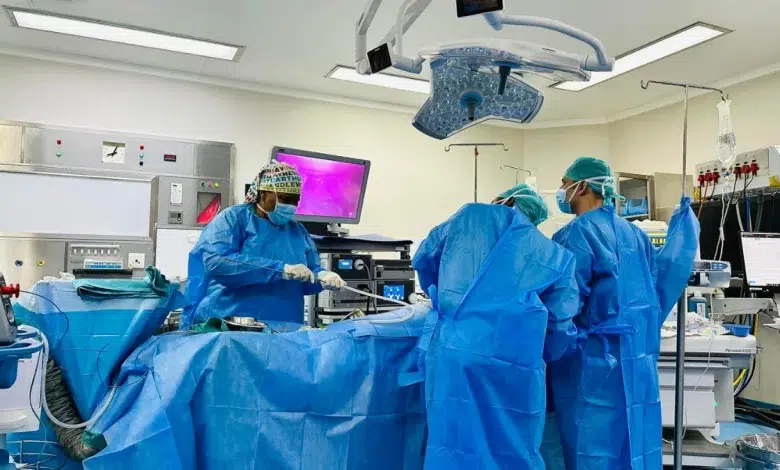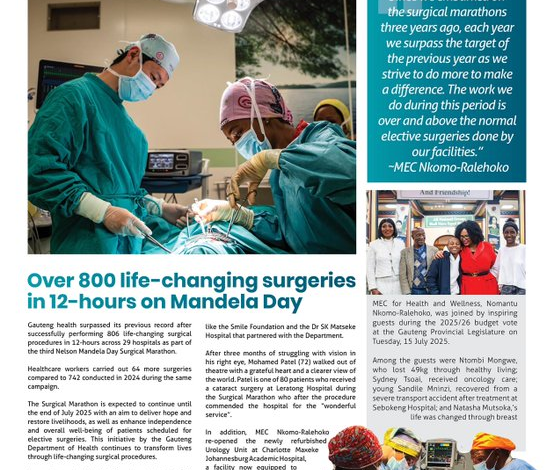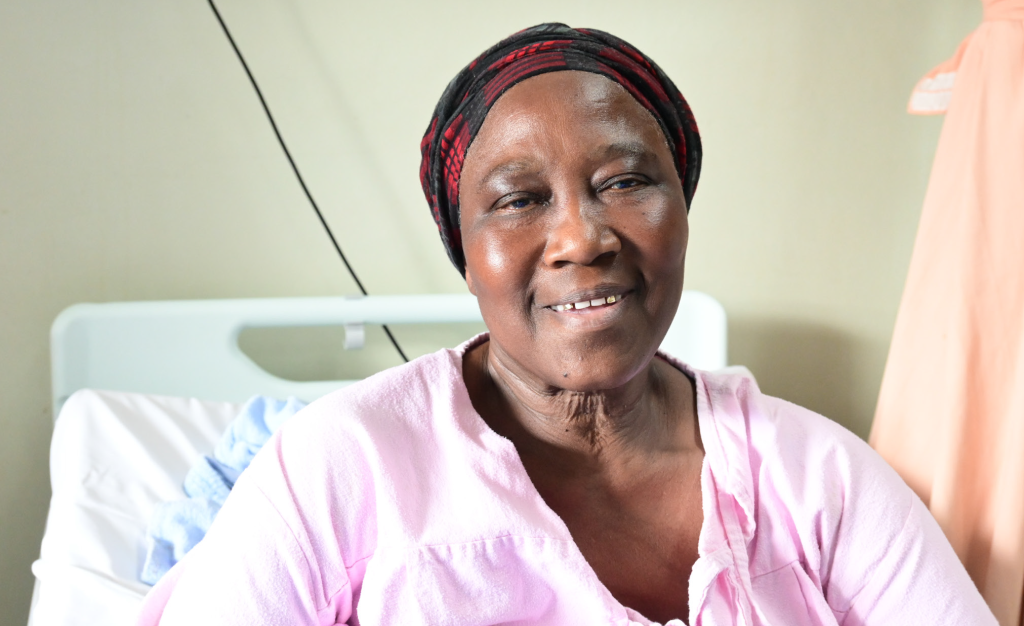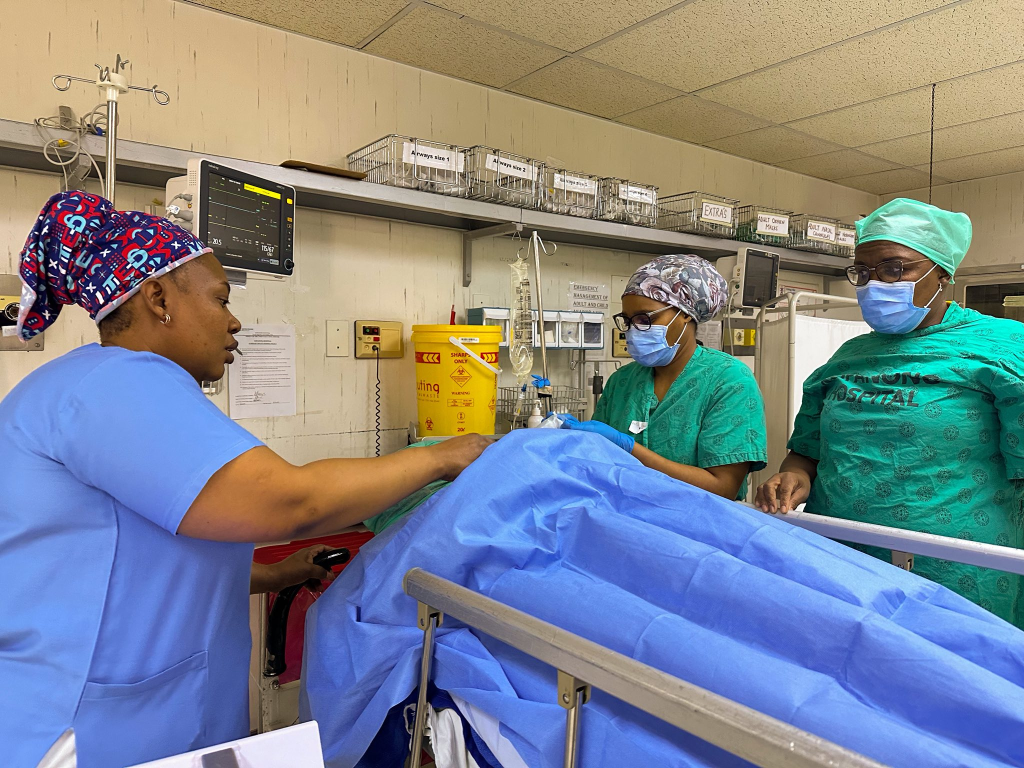Inside Gauteng’s Surgical Marathon That Changed 806 Lives in 12 Hours

In a bold and unprecedented healthcare initiative… The Gauteng Department of Health (GDoH) recently achieved an extraordinary feat: conducting 806 life-altering surgeries in just 12 hours. This monumental event, the third edition of the Mandela Day Surgical Marathon. The initiative saw 29 hospitals across the province participate in a mission that aimed to provide free surgical care to thousands of patients in need.

Table of contents
- What Is the Surgical Marathon?
- A Record-Breaking Day: 800 Lives Transformed
- Spotlight on the Patients
- Real Stories of Healing
- Collaborative Effort Across Medical Institutions
- Addressing Health Inequality in Gauteng
- The Role of Medical Technology
- The Road Ahead: Expanding the Surgical Marathon’s Impact
- A Step Toward Healthier Communities
What Is the Surgical Marathon?
The Surgical Marathon is an annual event designed to provide essential surgical services to patients who are often left on long waiting lists due to high demand and limited resources. The initiative aims to address the backlog of medical procedures. Focusing on those suffering from conditions that significantly impact their quality of life. In a province where healthcare facilities often struggle to meet patient demand, the marathon acts as a catalyst for urgent medical interventions. This initiative provides much-needed relief to individuals whose lives have been stalled by untreated health conditions.
This year, the marathon spanned 29 hospitals, where medical professionals, including surgeons, anaesthesiologists, nurses, and support staff, worked tirelessly to complete hundreds of procedures in a compressed timeframe. From cataract removals to prostate surgeries, the event included a wide range of medical interventions aimed at improving patient mobility, quality of life, and overall health.
A Record-Breaking Day: 800 Lives Transformed
On the 18th of July 2025, the participating hospitals conducted 806 surgeries, marking a record for the initiative. Each surgery, while routine for the medical teams, represented a life-changing moment for the patients involved. These procedures ranged from simple to complex, with a variety of specialties represented, including general surgery, orthopaedics, urology, and more.

For some, the day was about restoring sight. For others, it was about offering mobility or alleviating chronic pain. In all cases, these surgeries represented a significant turning point for patients who had been waiting for life-improving procedures for months, or even years. The initiative’s impact on the health system is profound. It demonstrates how public health resources, when strategically coordinated, can create transformative change.
Spotlight on the Patients
Among the many beneficiaries of the Surgical Marathon were Khupe Mthandazi, a 27-year-old from Edenvale, Virginia Kgwale, a 69-year-old woman from Johannesburg, and Cathrine Mashapa, a 58-year-old from Soshanguve. All three faced significant health challenges, but thanks to the medical advances provided through the event, they now share stories of hope and resilience.
These stories of Mthandazi, Kgwale, and Mashapa reflect the real impact of the Surgical Marathon. It’s not just about the physical restoration but also the emotional recovery. Each patient’s journey represents resilience, hope, and a chance to reclaim their lives.
Real Stories of Healing
In 2023, both Mthandazi and Kgwale had stoma surgeries, and during the marathon event, their stomas were successfully reversed, giving them new hope. For Mthandazi, the stoma had forced him to step away from his passion for soccer. “I felt uncomfortable, like I wasn’t myself anymore. I stopped playing and hanging out with friends,” he shared. The reversal surgery allowed him to regain his confidence, and he is eager to get back to the soccer field.
Similarly, Virginia Kgwale, who lived with a stoma bag, found the condition challenging both physically and emotionally. “It took time to learn how to manage it. At my age, it was hard, especially when the bag leaked, and my sons couldn’t always help,” she explained. Now, post-surgery, she has regained mobility and comfort. “I can sleep and move without worrying about leaks,” she said.

Cathrine Mashapa’s journey was different but equally transformative. Diagnosed with arthritis in her early fifties, Mashapa endured seven years of chronic pain, limiting her mobility and independence. “I relied on crutches and had to retire early from my job as a domestic worker,” she recalled. In 2025, Mashapa received a total knee replacement surgery during the Surgical Marathon, a procedure that has given her renewed hope. “The pain I feel now is nothing compared to the pain I lived with before the surgery. I can’t wait to be with my grandchildren again,” she said.
Collaborative Effort Across Medical Institutions
The success of the Surgical Marathon was not the result of a single institution’s efforts but a collective endeavour involving the medical community, local authorities, and volunteers. Each participating hospital brought its own expertise and resources to the table, ensuring the event’s success. This collaborative model highlights the strength of Gauteng’s healthcare system, where various hospitals and clinics work together to address shared challenges.
Exceptional Dedication from Medical Teams
Dr George Mukhari Academic Hospital, for example, played a significant role with a diverse team performing various surgeries. The event was not limited to high-profile cases; it also included routine yet essential procedures that positively impacted the lives of vulnerable patients. Despite the logistical challenges of coordinating numerous surgeries at multiple locations, the medical staff’s dedication and exceptional organisational skills ensured that every patient received timely, effective care.
Addressing Health Inequality in Gauteng
One of the primary objectives of the Surgical Marathon is to reduce the inequality in access to healthcare services across Gauteng. The province, which has a rapidly growing population, is often burdened by healthcare infrastructure challenges, including overcrowded hospitals and long waiting lists. For many, the Surgical Marathon is the difference between enduring prolonged suffering and finally receiving the treatment they desperately need.

Through events like these, the Gauteng Department of Health strives to make healthcare more equitable by targeting underserved communities. Many of the patients who benefited from the marathon would not have been able to afford private healthcare or the long wait for surgery in the public system. By providing free surgical care, the department is working to bridge the gap between the wealthier and poorer sectors of society, ensuring that all citizens have access to the medical care they deserve.
The Role of Medical Technology
One of the unsung heroes of the Surgical Marathon was the use of medical technology. For example, advanced surgical equipment, anaesthesia techniques, and monitoring systems helped medical teams perform complex surgeries with precision and speed. These technologies ensured that patients not only received the care they needed but did so in the safest and most efficient manner possible.
Furthermore, the Gauteng Department of Health is also leveraging technology to improve the overall healthcare system. With initiatives like the digitisation of patient records, healthcare professionals can access up-to-date patient information quickly and securely, which improves treatment outcomes and reduces the risk of errors. Such innovations are essential in a province that continually seeks to improve healthcare delivery.
The Road Ahead: Expanding the Surgical Marathon’s Impact
While the 2025 Surgical Marathon was an enormous success, the Gauteng Department of Health is committed to expanding its reach in the coming years. Plans are already in place to include more hospitals in the next iteration of the marathon… With an increased focus on providing specialized care to rural areas and underserved communities. By growing the scope of the event, the department hopes to continue tackling the surgical backlog and provide life-changing interventions to even more patients.
The success of this year’s Surgical Marathon also highlights the potential of such initiatives to drive lasting change. Gauteng is demonstrating that meaningful progress in addressing healthcare inequality is possible by fostering collaboration across the healthcare sector and leveraging cutting-edge medical technologies.
A Step Toward Healthier Communities
The Mandela Day Surgical Marathon serves as an inspiring example of what can be achieved when communities, healthcare professionals, and government bodies work together toward a common goal. For the 800+ patients who received life-saving surgeries, the event marked the beginning of a new chapter. Thanks to the dedication of the Gauteng Department of Health and its partners, these individuals can now look forward to healthier, more fulfilling lives.
Through initiatives like the Surgical Marathon, Gauteng is not just addressing immediate healthcare needs, it’s building a more resilient healthcare system for the future.



